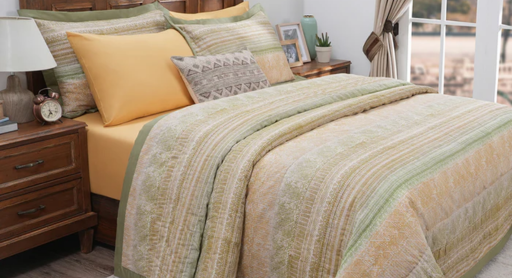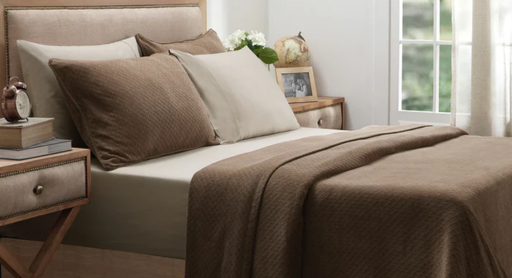A fitted sheet is a staple in every bedroom—a daily essential that ensures comfort and a polished bed. But have you ever considered the environmental cost of the fabrics and processes behind it? As consumers grow more conscious about sustainability, understanding how your bedding choices impact the planet is crucial. At maspar, we believe in combining comfort with responsibility. In this blog, we’ll explore the environmental footprint of fitted sheets and how you can make greener choices without compromising quality or design.
The Hidden Environmental Cost of Conventional Bedding

Most fitted sheets on the market are made from materials that undergo extensive manufacturing, chemical treatments and long-distance transportation. These steps can have lasting effects on the environment.
1. Resource-Intensive Fabric Production
Traditional cotton, one of the most common bedding materials, often requires massive amounts of water, pesticides and energy. For example, producing just one kilogram of conventional cotton can use up to 20,000 liters of water. This contributes to water scarcity in regions already facing climate challenges.
2. Synthetic Fibers and Microplastic Pollution
Fitted sheets made from polyester and other synthetic materials are derived from petroleum. When washed, they release microplastics into water systems, harming marine life and polluting ecosystems.
3. Chemical Processing and Dyes
From bleaching to dyeing, conventional textile production involves toxic chemicals that can seep into soil and waterways. These chemicals not only harm the environment but may also cause skin irritation over time.
4. Transportation and Packaging Waste
Most bedding is manufactured in bulk overseas, shipped long distances and wrapped in plastic-heavy packaging. This increases the carbon footprint and contributes to landfill waste.
Sustainable Fabric Options for a Greener Choice

Choosing a fitted sheet made from eco-friendly materials can significantly reduce your impact on the environment. Let’s look at the most sustainable options:
Organic Cotton
Grown without harmful pesticides and fertilizers, organic cotton uses significantly less water and energy. It’s gentle on the skin and supports healthier farming practices.
Benefits:
-
Biodegradable
-
Low water usage
-
Safer for farmers and wildlife
Bamboo
Bamboo grows quickly and requires no chemical pesticides or herbicides. It regenerates naturally and produces more oxygen than trees.
Benefits:
-
Antibacterial properties
-
Highly breathable
-
Naturally renewable resource
Linen
Made from flax plants, linen is one of the oldest and most eco-friendly fabrics. It requires minimal irrigation and is fully biodegradable.
Benefits:
-
Durable and long-lasting
-
Moisture-wicking
-
Earth-friendly from seed to sheet
TENCEL™ (Lyocell)
Produced from sustainably sourced wood pulp, TENCEL™ is a soft, breathable fabric that’s made using a closed-loop process, where solvents are recycled and reused.
Benefits:
-
Soft as silk
-
Minimal environmental impact
-
Low energy and water consumption
What to Look for in a Sustainable Fitted Sheet
Choosing an eco-friendly fitted sheet goes beyond just fabric. Here’s what to consider:
Certifications Matter
Look for certifications such as:
-
GOTS (Global Organic Textile Standard)
-
OEKO-TEX® Standard 100
-
FSC (Forest Stewardship Council)
These labels ensure that products meet rigorous environmental and ethical standards.
Eco-Conscious Packaging
Brands committed to sustainability often reduce plastic usage and use recyclable or compostable materials for packaging.
Responsible Manufacturing
Check if the brand practices ethical labor sourcing, reduces waste and follows environmentally sound manufacturing processes.
maspar’s Commitment to Sustainable Living

At maspar, we believe that comfort and sustainability go hand in hand. Our collections are thoughtfully curated with natural fabrics, low-impact dyes and quality that lasts. We aim to reduce environmental impact by focusing on responsible sourcing, durable design and waste-conscious packaging. Our fitted sheets not only elevate your sleep experience but also support a more mindful planet.
Conclusion
The fitted sheet you choose is more than just a fabric layer—it’s a statement about your values and how you engage with the world. By opting for sustainable materials and ethical production, you can reduce your ecological footprint while enjoying the comfort and elegance you deserve. At maspar, we invite you to embrace bedding that’s as kind to the earth as it is to your skin.
FAQs
Q1. What makes a fitted sheet sustainable?
A. Use of eco-friendly fabrics, ethical manufacturing and low-impact dyes.
Q2. Is bamboo more sustainable than cotton?
A. Yes, bamboo requires less water and grows without chemicals.
Q3. Are organic cotton sheets better for sensitive skin?
A. Yes, they are free from harmful chemicals and gentle on the skin.
Q4. Can sustainable fitted sheets be machine washed?
A. Absolutely. Just follow care instructions for longevity.
Q5. How do I know if a product is truly eco-friendly?
A. Look for certifications like GOTS, OEKO-TEX® or TENCEL™.





